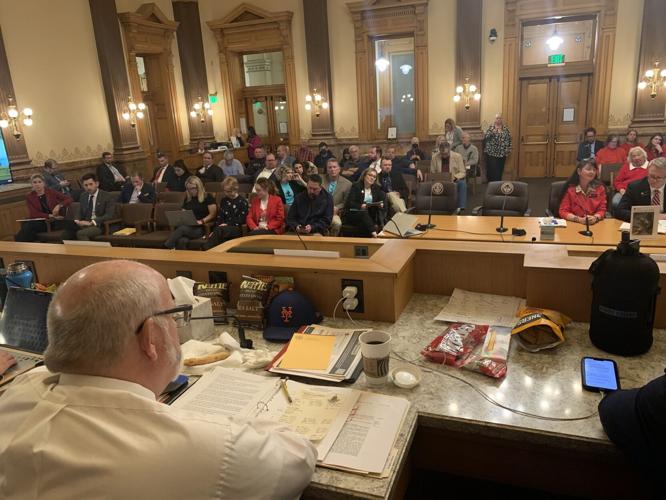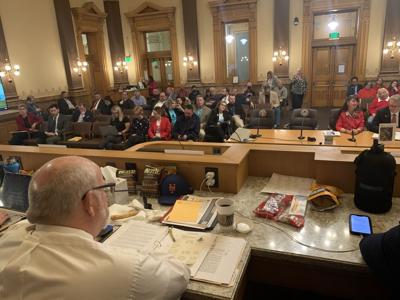Three measures supporters say will rein in gun violence won party-line approval by a Senate panel after an all-day hearing that stretched late into the evening.
The first measure, Senate Bill 170, seeks to strengthen the state's extreme risk protection order — more popularly known as the "red flag" law — by allowing district attorneys, educators, and health care professionals, including mental health providers, to seek that intervention from the court.
Under the law, first adopted in 2019, only law enforcement or a family member can seek the order to remove firearms from a person who is considered a danger to themselves or to others.
In 2020, the law's first full year, 109 orders were filed, of which 61 were granted on a temporary basis and 49 for an entire year, according to a study published in 2021 by the journal Injury Epidemiology. An analysis earlier this year by Colorado Public Radio says 40 out of 64 counties have never seen an ERPO petition.
Of the cases, more than half were filed by the Denver Police Department, while El Paso County's sheriff's department had never once sought an ERPO petition. Then-El Paso Sheriff Bill Elder had openly opposed the law during legislative hearings and Joe Roybal, the new sheriff, has said he will prioritize defending the Second Amendment. Neither has stated directly, though, that they would refuse to enforce the red flag law. Elder at first said deputies would not file ERPO petitions but would carry out any judicial order mandating weapons confiscation. Later he said his office would only file the petitions at the request of family members or under “exigent circumstances.”
Following the Club Q shooting last November — allegedly committed by a man who was already known to the El Paso County Sheriff's Department for making bomb threats the year before — Democratic lawmakers crafted legislation to add groups of people to the list who can seek a red flag order.
Wednesday's hearing drew people to the state Capitol who shared stories of the heartbreak they've suffered from gun violence and who argued that expanding the ERPO law would save lives. Opponents offered counterarguments, claiming the 2019 law is unconstitutional and its successor would be, too. A challenge to the law from Republican lawmakers, based on a technicality on how it was reviewed by the state House, is pending before the state Supreme Court.
Sen. Tom Sullivan, D-Centennial, one of the bill's sponsors, told the committee that a pro-gun activist promised to turn the building into a circus.
"My favorite part of any circus was when the clowns all come out of the little car," Sullivan said. "So, I'm gonna go outside and see if that little car is out there."
Among those who testified was former legislative aide Benjamin Teevan, who recounted how he found his mother dead from a self-inflicted gunshot wound last August.
"The most profound regret of my life is not seeking an ERPO," he said.
Teevan served as an aide when Republican Sens. Larry Liston and Mark Baisley both served in the House. They are now members of the Senate State, Veterans and Military Affairs Committee, which heard the bill, and both voted against it.
Roybal, El Paso's sheriff, told the committee that the ERPO law would not have stopped the Club Q shooting because it would not have applied to the weapons used by the shooter. Authorities had seized all the weapons the suspect had when the bomb threat took place under a search warrant tied to a protective order, and, at the time of the shooting, the sheriff's department still had those weapons.
That did not prevent the shooter from obtaining or possessing weapons illegally, Roybal said.
The second legislation, Senate Bill 168, seeks to allow gun victims to sue firearms manufacturers and gun dealers. The bill also establishes "a cause of action" to ensure victims or the attorney general, acting on their behalf, can seek fair compensation in court if they could prove they were harmed as a result of the gun industry member knowingly violating responsible conduct.
It repeals state law that prevents gun victims from having their day in court, according to co-sponsor Sen. Jaquez Lewis, D-Longmont.
The bill's third part, co-sponsor Sen. Chris Kolker, D-Centennial, said, it establishes a firearm industry standard of conduct and requires industry members to take "modest, reasonable precautions to prevent gun trafficking in other preventable harms." He added the measure is intended to fit within the exceptions allowed under the 2005 federal Protection of Lawful Commerce in Arms Act, which generally protects firearms manufacturers from liability.
"It is time to treat the firearm industry and other businesses equally," Kolker said.
Jaquez Lewis said Colorado is one of three states, along with Indiana and Arkansas, with "extreme anti victim laws that include a punitive provision that can bankrupt a gun violence victim and their families if they take the bad actors in the gun industry to civil court."
That's what happened to the parents of Jessica Ghawi, who was one of the victims of the Aurora Theater shooting in 2012. The dealer that sold the gunman thousands of rounds of ammunition, large capacity magazines and body armor failed to do a background check. Her parents, Sandy and Lonnie Phillips, sued in civil court and lost because of Colorado's law and had to pay $260,000 in legal fees. They eventually filed for bankruptcy.
Jaquez Lewis, during her comments on the bill, brought along a picture of a gun being marketed to children, which drew criticisms even from those who opposed the bill, who called the ad irresponsible.

The JR 15 firearm, which "looks and feels and operates just like Mom and Dad's gun." Ad courtesy Wee-1.
Jane Dougherty — whose s sister, a school psychologist, was murdered at Sandy Hook Elementary in 2012 — said they obtained a $73 million judgment against Remington Arms, which filed bankruptcy as a result but had to sue under the Connecticut Unfair Trade Practices Act to get around the federal law. Had the families sued in Colorado, she said, they would never have been able to seek justice.
Tom Mauser, whose son, Daniel, was murdered at Columbine, said he did not sue the parents of the two teens who killed his son in 1999.
"I'm actually leery of lawsuits against gun makers merely because their gun was used in a crime," he told the committee.
But he said existing law says the gun industry can effectively do no wrong — nothing beyond a product defect.
"Are we supposed to believe that no gun dealer recklessly makes a sale to a shady character or sells something off the books or that no gun maker looks the other way?" he said. "You cannot tell me that this is an honorable industry above reproach that deserves immunity like no other industry."
"Let the courts decide whether the complaint is legitimate and who should pay the legal cost," he added.
Witnesses opposed to the bill pointed out numerous times that nobody sues a car manufacturer when a drunk driver kills someone.
Gun dealers pleaded with the committee not to put them out of business.
Craig Williams, a gun store owner in Peyton, said he should not be sued for someone else's actions.
"For those of us who want to protect ourselves, this is all we ask," Williams said. "Allow us to protect ourselves."
Holding a gun dealer responsible for the actions of others is irresponsible, said Sheriff Roybal, who has bought guns at Williams' store.
"I hope I'm wrong," Roybal said, "but 10, 15, 20 years from now, after gun regulation has taken firearms out of the hands of law abiding citizen and armed criminals ... we are going to arm criminals by doing this."
David Kopel, the research director of the Independence Institute but who testified on his own behalf, said SB 168 will not create a level playing field. Instead, he said, it will create a special category of lawsuits only against the gun industry, including local mom-and-pop firearms businesses. He also questioned whether the attorney general would sue even when a victim doesn't want to.
The bill, he said, is intended to put the firearms industry and dealers out of business through "abuse litigation."
Sullivan, whose son was among those killed in the Aurora mass shooting, and one witness got into a heated exchange when the legislator tried to ask how much profit a dealer would make on 4,000 rounds of ammunition, along with a graphic description of his son's injuries, as well as Ghawi's.
Other witnesses who support the bill responded to multiple claims by opponents that car manufacturer's don't get sued. They are sued — when the car is defective, they said.
Former Sen. Evie Hudak, who represents Colorado PTA, also testified in favor of all three bills. Hudak resigned her Senate seat in 2013, facing a recall over her votes on gun control bills passed in that session. Two other Democratic senators were recalled by voters over those bills.
The third bill, Senate Bill 169, which the committee is tackling at press time and is also expected to win approval on a party-line vote, seeks to raise the legal age for purchasing a firearm from 18 to 21. It also bars those under 21 from possessing a firearm.
The measure, sponsored by Sens. Kyle Mullica, D-Thornton and Jessie Danielson, D-Wheat Ridge, includes a handful of exceptions, such as for active-duty military or law enforcement, individuals with hunting licenses, and those under the supervision of an "immediate family member" age 25 or older.
The bill as introduced had no exceptions for wildlife management, such as for a person under the age of 21 working on a ranch who must defend a herd from predators, or for those who enlist in the military at 17 on a two-year term and are veterans but no longer active-duty at 19.
Young people enrolled in the Division of Parks and Wildlife's (CPW) hunter education programs pointed out that the bill conflicts with the rules for those programs, which allow young people at least 10 years old to enroll. Others noted the bill would impact their ability to defend their livestock from predators.
The committee amended the bill to address those concerns. The amendment specifically addressed the hunter education program requirements from CPW. On the predator issue, Mullica said the amendment would match up with previous statutory language used to address predation, such as from the safe storage bill from two years ago. That bill allowed for an affirmative defense for someone using a gun to defend livestock.
Editor's note: A previous version incorrectly stated a witness had served as an aide to two Republican House members. The story has also been updated with information on an amendment to the bill raising the age limit.




(0) comments
Welcome to the discussion.
Log In
Post a comment as Guest
Keep it Clean. Please avoid obscene, vulgar, lewd, racist or sexually-oriented language.
PLEASE TURN OFF YOUR CAPS LOCK.
Don't Threaten. Threats of harming another person will not be tolerated.
Be Truthful. Don't knowingly lie about anyone or anything.
Be Nice. No racism, sexism or any sort of -ism that is degrading to another person.
Be Proactive. Use the 'Report' link on each comment to let us know of abusive posts.
Share with Us. We'd love to hear eyewitness accounts, the history behind an article.